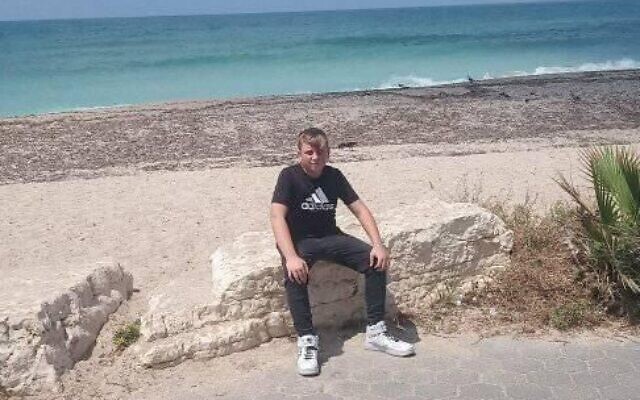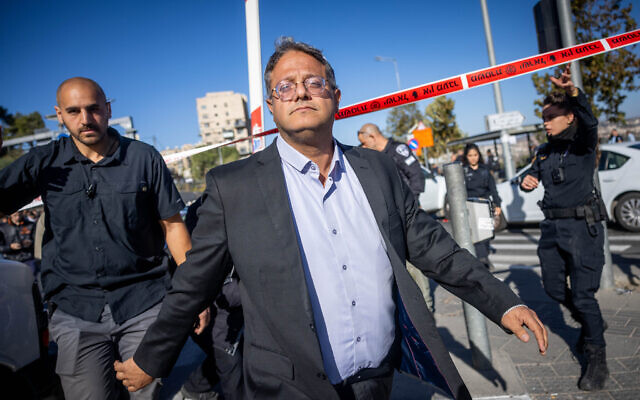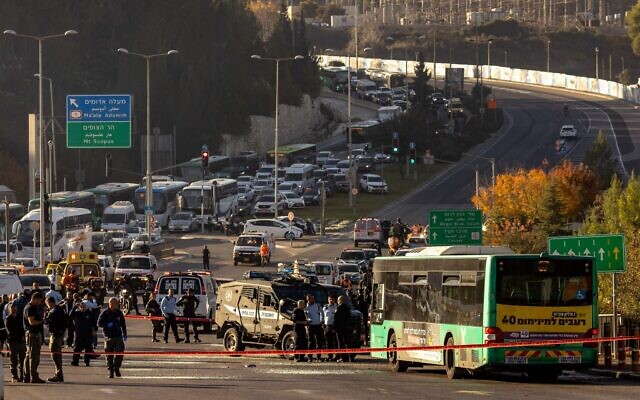Family, friends and others packed the Givat Shaul cemetery in Jerusalem on Wednesday afternoon to mourn 16-year-old Aryeh Schupak, killed hours earlier in a bombing at a bus stop just a short distance away.
Schupak, a dual Israeli-Canadian citizen, was killed in the first of two terror bombings at bus stops that rocked the capital Wednesday morning.
"I just want to say bye to my son Aryeh and apologize to him for something I did or didn't do," Aryeh's father Rabbi Moshe Schupak told mourners in Russian-accented English, while choking back tears. "Only one thing comes to mind, that there are things that are important and things that are not. To appreciate every minute with the child and with the family."
Schupak had been making his way to Yeshivat Harei Yehuda in Moshav Beit Meir, where he studied, when a device planted at a bus stop near the western entrance to Jerusalem exploded, killing him. Another 22 people were injured in the bombing, and by another blast at a bus stop near Ramot a short time later, including a friend of Schupak's who had been traveling with him to school.
Rabbi Naftali Schreiber, head of the yeshiva where Schupak studied, said the teen had considered staying home Wednesday after feeling unwell in the morning.
Get The Times of Israel's Daily Edition by email and never miss our top stories
By signing up, you agree to the termsSchreiber said a staff member told him to not come in and rest instead. "But he got over it, got up, and decided to go to learn at the yeshiva," Schreiber said.
"A boy who fought hard, set out on a good path despite not having an easy life. I can testify that nobody felt anger with this child. He didn't know what anger was. He would help everyone in the street and was loved by mankind," he said.

16-year-old Aryeh Schupak, killed in a bombing attack at the entrance of Jerusalem, November 23, 2022. (Courtesy)
Shlomo Benjamin, who taught Schupak at the yeshiva, told Kan radio that the school was overcome with grief over the death.
"He was the special one in the group, a boy really loved by people, loved by everyone, with humor and a joy for life. He fought like a lion, like his name, to succeed in his studies and Torah," Benjamin said.
Few details were available about Schupak, who lived in Jerusalem's Har Nof neighborhood.
Rabbi Avraham Meir Steinfeld, a close friend of the family, told the Walla news site that the family had arrived from Russia at least 15 years ago, though reports indicated that the family also spent time in Canada. He described them as "quiet and straightforward."
Canada's Prime Minister Justin Trudeau mourned Schupak in a tweet.
"Incredibly saddened to learn about the death of a young Canadian in the terrorist attack in Jerusalem. I'm sending his family and friends my deepest condolences. I'm also thinking of those who were injured," he wrote.
Otzma Yehudit chair Itamar Ben Gvir was among hundreds who attended the funeral. Earlier, the far-right lawmaker, who is pushing to become the next public security minister, visited the scene of the attacks and called for harsher action against perpetrators of terrorism.
"We need to return to targeted killings. To raise the price of terror and to end the celebration and frivolities at security prisons. We need to establish a government faster, terrorism doesn't wait."
US Ambassador to Israel Tom Nides said two of the wounded in the Jerusalem bombings were American citizens, and indicated that they were expected to recover.
One victim, an Ethiopian immigrant in his 40s, remained hospitalized in critical condition after sustaining serious head injuries in the first bombing.

Otzma Yehudit leader MK Itamar Ben Gvir at the scene of a terror attack near the entrance to Jerusalem, on November 23, 2022. (Yonatan Sindel/Flash90
Presumed prime minister Benjamin Netanyahu wished "a quick recovery to the injured, especially the most seriously injured — an Ethiopian immigrant," and noted the terror attack occurred on Sigd, an Ethiopian Jewish holiday.
"Today is a festival for Ethiopian Jews. The terror attack occurred on the Sigd holiday, and indeed today we pray for his recovery."
Prime Minister Yair Lapid vowed that security forces would capture the suspected terror cell that planted the two bombs: "We will get to them. They can run away, they can hide, it won't help them. The security forces will get to them. If they resist, they will be killed. If not, we will deal with them with the full severity of the law."
The first explosion occurred close to the main entrance of Jerusalem in Givat Shaul, shortly after 7 a.m., a peak commuter hour. The second blast occurred shortly after 7:30 a.m., at Ramot Junction, another area in Jerusalem normally packed with travelers.
Police suspected that the explosions were caused by near-identical remotely detonated explosive devices hidden behind the bus stops in bushes. The devices were packed with nails to maximize casualties, according to police officials.

Police and security personnel at the scene of a terror attack in Jerusalem, on November 23, 2022. (Olivier Fitoussil/ Flash90
There were no immediate claims of responsibility, but the Hamas and Palestinian Islamic Jihad terror groups hailed the attacks.
The bombings came during a time of heightened tensions, following a series of Palestinian attacks that have left 30 people dead in Israel and the West Bank since the start of the year, including Wednesday's attack.
In recent months, there have been several stabbing and attempted stabbing attacks in Jerusalem, mostly in the Old City. Last month, a Palestinian gunman killed an Israeli soldier at a checkpoint near Jerusalem.
In the spring, the military launched a major anti-terror offensive in West Bank following the attacks.
The operation has netted more than 2,000 arrests in near-nightly raids, but has also left over 130 Palestinians dead, many of them — but not all — while carrying out attacks or during clashes with security forces.
Bombings on buses and in public places were a hallmark of the Second Intifada from 2000 to 2005, but mostly subsided over the last 17 years, which Israeli officials attributed to increased security measures, including the West Bank security barrier, and better intelligence.
In 2016, the Hamas terror group was accused of bombing a bus in Jerusalem, leaving 21 people injured. And in 2011, a bomb hidden in a backpack exploded at a bus stop outside the Jerusalem International Convention Center, killing two and injuring dozens more.
Emanuel Fabian contributed to this report.

Post a Comment